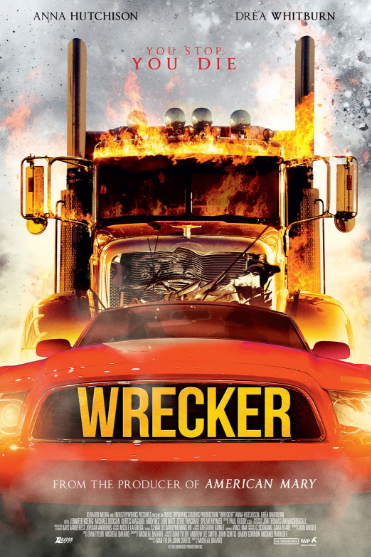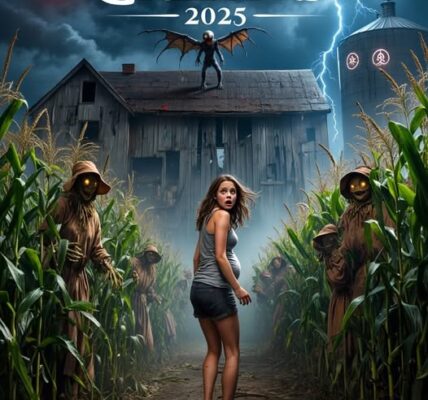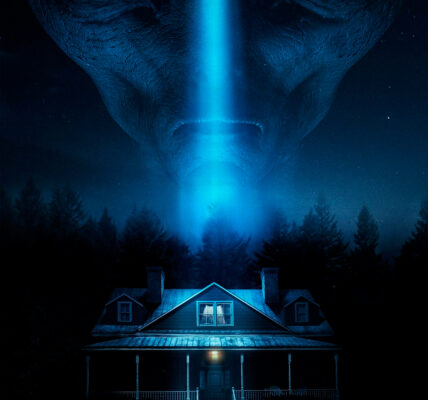1. Plot Summary
Two best friends, Emily and Leslie, set out on a road trip through the desert. Emily is frustrated with her boyfriend and wants distance, so she and Leslie decide to drive from Seattle to Palm Springs. Along the way, Leslie suggests taking a backroad – a shortcut known as “Devil’s Pass.”
Soon after turning off the main highway, they get stuck behind a nasty, foul-smelling tow truck that seems determined to mess with them. What begins as irritation escalates into a dangerous game of cat and mouse as the truck driver stalks them. Car trouble, low gas, flat tires, cell signal loss, and a rising feeling that something more than just road-rage is at play, all heighten the tension. Emily tries several escape routes, and Leslie becomes increasingly terrified. Eventually, the conflict culminates in a confrontation, and Emily must figure out how to survive when nearly everything seems stacked against her.
2. Notable Elements
Here are some of the things about Wrecker that stand out—both the positives and negatives:
What works / is noteworthy:
- Premise & Atmosphere: The stripped-down “roadtrip gone wrong” setup is classic, giving potential for tension. The isolation (Devil’s Pass, desert), the lack of cell service, car trouble – all classic horror/thriller ingredients.
- Female leads: It’s nice that the protagonists are two women, Emily and Leslie, who are more than just “damsels.” There’s emotional motivation (relationship problems, wanting freedom) behind their choices. This gives some dimension beyond pure trap/horror. The director has said that the theme is abusive relationships: the way the trucker “relationship” with them begins mildly (as annoyance) and increases in extremity mirrors patterns of abuse.
- Visuals / Sense of Road Horror: Some of the film’s shots of highways, the truck trailing behind or ahead, the desert mirrors, isolating landscapes, are effective at creating tension. The “you’re never alone on the road” motif is used.
What doesn’t work / problematic elements:
- Repetition & Pacing: Many reviewers comment that the film has a lot of repetitive chase/taunting scenes with little variation. Once the truck starts following them, much of the film recycles tension without giving enough new twists.
- Character Depth: Emily and Leslie’s backstories are thin. Their fears and personalities are not deeply explored, so when things get scary, sometimes there’s less emotional attachment. The audience may not feel as strongly for their survival or as invested in their choices.
- Comparisons with “Duel” and originality: Many reviews point out that Wrecker borrows heavily from earlier works, especially Duel (1971), Joy Ride, etc. While homage can be good, Wrecker is criticized for not adding much new to the formula.
- CGI / realism issues: Some of the action/confrontational scenes, especially near the finale, suffer from less convincing effects and stunts. When tension depends on believability, those moments pull you out.
3. Themes and Messages
Here are the deeper ideas Wrecker tries to explore, and how they resonate (or fail to) with broader sentiments:
- Abusive Relationships / Power & Control: A central theme is how a “relationship” (though here metaphorical) turns from mild annoyance/power imbalance to aggressive intimidation and terror. The tow truck driver’s behavior parallels an abuser: stalking, control, escalation. The film seems to use that as its underlying tension rather than making it purely a monster/villain vs victims dynamic.
- Fear of loss of control / vulnerability: On a road trip we expect freedom; the film inverts this. The car which should protect the characters becomes vulnerable (breakdowns, flat tires, low fuel), the open road becomes dangerous when help is far away. There is a sense that small decisions (taking a shortcut, ignoring warnings) have big and dangerous consequences.
- Paranoia and isolation: With no cell reception, remote roads, the overwhelming presence of the truck, and Emily’s increasing distress, the film seeks to evoke that primal fear: what if there is no help? What if what’s chasing you doesn’t have to follow rules?
- Good vs evil without clear motives: The truck driver is a largely anonymous villain, which is reminiscent of many road-horror and stalker films. Part of the tension comes from not really knowing why he is doing what he is doing — it creates menace by ambiguity. This can be effective, but also frustrates if you want backstory.
Relating to holiday traditions / sentiments: Wrecker isn’t a holiday movie. Its themes don’t connect to celebration or warmth; instead they deal with fear, survival, control & violation. If anything, it’s the kind of movie that works in contrast to holiday cheer—perhaps a reminder of how fragile safety and trust are, which could make one appreciate peace and kindness more during holidays.
4. Personal Impressions
Here are my thoughts, balancing what I liked and what I felt didn’t quite land:
What I liked:
- For a film of this type, the tension is serviceable. Some early scenes where the truck starts to taunt / intimidate the women do generate unease. The concept of road horror is well suited to remote backroads.
- The notion of a “driver from hell” as an almost mythic threat is compelling — the anonymity of the villain adds psychological weight.
- The female protagonists are somewhat more interesting than in many low-budget horror films: Emily’s frustrations, the relationship issues with her boyfriend, the sense that she’s making decisions to assert herself, gives more foundation than if the characters were just screaming victims.
What I felt less satisfied with:
- The film’s tension tends to plateau. Once the initial scares are established, many repeats feel like filler. There are few truly surprising moments past the first half.
- The ending’s supernatural / paranormal implication (that the danger isn’t over) feels a bit tacked on, maybe trying to give lingering impact but not quite earned by what came before.
- Some of the supporting character bits (gas station, diner, the “helping stranger”) feel predictable and even cliché. The film leans on genre tropes in ways that don’t always feel fresh.
- The visuals—while occasionally strong in capturing isolation—don’t always elevate the suspense. There are stretches where one wonders why the characters don’t make more realistic decisions (which is common in horror, but here it stands out).
5. Audience Recommendations
Here’s who might enjoy Wrecker, and who less so:
Who might like it:
- Fans of road-horror / stalker thrillers where a vehicle is central antagonist. If you liked Duel, Joy Ride, Breakdown, or similar, this may scratch a comparable itch.
- Viewers who don’t mind predictable elements, and are watching more for consistent tension than deep character arcs or originality.
- People who enjoy horror/thrillers centered on atmosphere, isolation, and that creeping dread rather than brutality or gore.
- Those who like female leads and wish more genre movies did this (even though Emily & Leslie are not deeply nuanced, they do offer more than stereotypical roles).
Who might dislike it:
- If you want a film that breaks new ground, or surprises you with twists or deep emotional investment, Wrecker may feel shallow.
- If you have trouble suspending disbelief when characters make poor decisions or when effects / stunts feel a bit off, those moments might reduce enjoyment.
- If you prefer horror or thrillers with more developed villains (with motivations, backstory), Wrecker offers very little in that department.
6. Conclusion & Rating
Final Thoughts:
Wrecker (2015) is a modest thriller: it has a familiar formula, it doesn’t stray far from road-rage horror tropes, but it delivers enough tension to be watchable for the right audience. It’s not reinventing the wheel, and it doesn’t always maximize its potential, but there are moments where its simplicity works in its favor: you get a lean, relatively short ride, some effective scares, and the unease of being stalked when escape seems always just out of reach.
If you go in expecting something novel, you’ll likely come away disappointed. But if you’re okay with a genre movie that does what it sets out to, with few surprises, it may still be entertaining.
Star Rating: ★★☆☆☆ (2.5-3 out of 5)
Watch more:




